Kara Danvers began her superhero journey on shaky ground, soared into our hearts, fell, and is now redeeming herself with time, hard work, and patience. In the course of the season, she moves from causing oil spills to sacrificing herself to save earth from Myriad. This sacrifice moves us not only because it is the culmination of a redemption arc, but also because it represents her willingness to give up all she had gained. As she realizes in “For the Girl Who Has Everything”, Earth is her true home, not Krypton. Her family, her friends, her job, her mentor, and her romantic interest are on Earth. Having found a true home and made meaningful connections, she willingly offers that up to save it from being destroyed. In short, she’s learned that a true hero has to be willing to make sacrifices.
Quick Recap of Episodes 17-20: The Redemption Arc
These episodes pick up where 16 left of: Kara has fallen and is eager to prove herself to the people of National City. Unlike many so-called “redemption arcs” we’ve seen (ahem, Bellamy Blake), Kara has to work for hers. She’s learns work/life balance, boundaries, how to embrace her true self, how to forgive others, and how to restore friendships and relationships when trust is broken. The people of National City rally around her when they perceive she is willing to risk her life for them. After having threatened the life of the most important person in National City during her fall, her actions to save everyone represent her upward momentum.
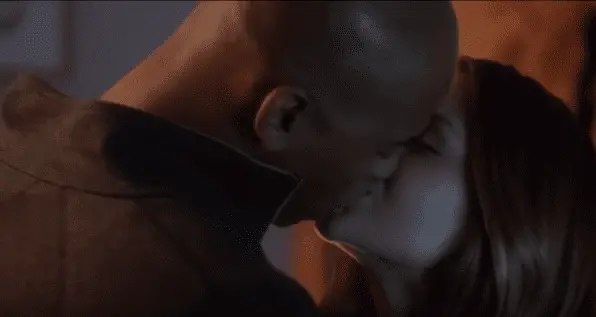
Rather than mope or blame the people for not trusting her, she earns it back. She enters into the finale knowing full well what she loses if she does not survive the confrontation with Non and Indigo, but she also knows that what Earth gains in return matters to her as much as her self-actualization does. After all, she’s Supergirl, and she wants to help people survive and thrive, to love openly, and most of all, to choose hope. Plus, she finally gets to kiss James Olsen. And we get some of the best monologues of the season, hands down.
Episode 17: Manhunter
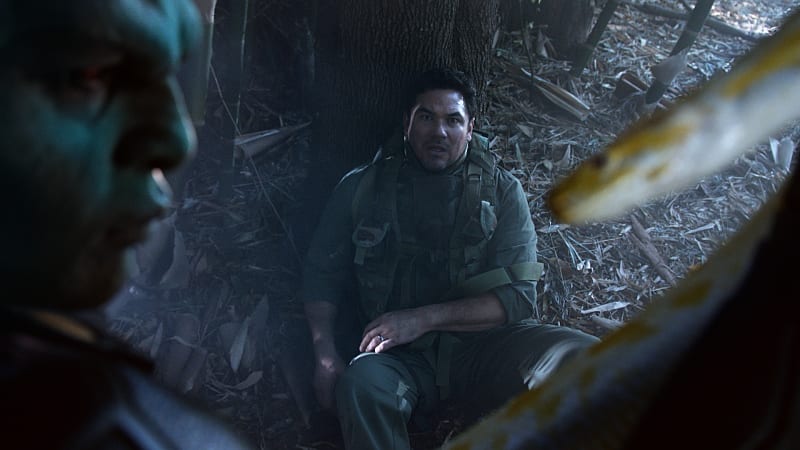 The one about belonging and how our heroes became who they are.
The one about belonging and how our heroes became who they are.
Kara stays home sick depressed from work, forcing James to answer Cat’s phone while Winn emotionally supports Siobhan after she was fired. At the DEO, Alex brings J’onn Chocos in his cell and refuses to abandon him. Col. James Harper arrives to investigate J’onn infiltrating the DEO with Lucy in tow (now restored to her position as legal attaché). Harper and Lucy interrogate J’onn in a room that blocks his and Supergirl’s powers. He can’t transform or read minds and she can’t listen in.
In a flashback, Mr. Dr. Jeremiah Danvers is unsure of the Martian manhunt (lol) that real!Hank has ordered. Jeremiah gets separated from the group on their hunt in Peru, gets scared by a giant snake, and is saved by J’onn. Harper blames J’onn for Jeremiah’s death. Another flashback: Jeremiah saves J’onn’s life when real!Hank tries to shoot him, but gets fatally wounded in the process. Real!Hank falls off a cliff. Harper (Real!Hank’s friend) doesn’t believe J’onn and locks him up. Lucy thinks J’onn might be telling the truth.
At Catco, Siobhan sneaks in and sends Cat a mean email from Kara’s computer, hoping to get her fired. Agent Vasquez lets Supergirl listen into Harper and Lucy’s interrogation of Alex using her headset. Flashback to party girl Alex being recruited by J’onn!Hank. Alex lies about knowing Hank was an alien; Lucy notices and Alex is led away to join Hank at “Project Cadmus” (dun dun dun). James tells Kara that Cadmus is a government experimentation/dissection lab. Kara reveals herself as Supergirl to Lucy and asks her to help. Lucy is mad that superheroes “lie” about their identity, but Kara explains they do it to fit in because they won’t be accepted otherwise.
Flashback to young Alex wanting to fit in at school, Kara being awkward and overwhelmed by her powers but saving a mother and baby from a car crash, Jeremiah giving her a pair of lead lined glasses to help her ‘fit in’(they block her x-ray vision, relieving some of her sensory overload), and Kara applying for her job at Catco. Lucy and Kara team up to stop Alex and J’onn’s truck en route to Cadmus. J’onn wipes Harper’s memory, but also discovers that Jeremiah Danvers is alive and held prisoner at Project Cadmus (WHAT THE WHAT). Alex and J’onn go on the run to try and break him out. Cat calls Siobhan into her office, revealing that Winn had helped her determine that Siobhan actually wrote the email. Harper resigns from the DEO and appoints Lucy as new head. Siobhan gets drunk on a roof. Thinking she’s about to commit suicide, Winn goes to stop her. She falls, but stops inches from the ground, saved by her piercing (banshee) scream.
Best Quote: “Humans can be ignorant, especially when they’re scared. But I will do everything in my power to help keep you safe, help you find your place here. I’m Jeremiah Danvers, and you can consider me a friend.”—Jeremiah Danvers, to J’onn J’onzz (flashback)
Episode 18: World’s Finest
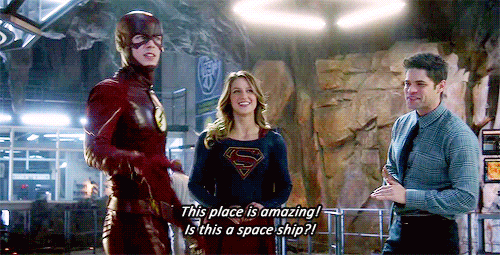
The Flash/Supergirl crossover episode.
Supergirl and Winn take Siobhan to the DEO, but get no answers about her scream powers. Cat tells Kara she needs to talk to James about their totally obvious feelings for each other, which is interrupted by Siobhan screaming Kara out the window. Right as she’s about to fly, The Flash runs up the building and catches her! Several adorable nerdfest-filled minutes of the Flash explaining the multiverse to James, Kara, and Winn (only Winn gets it) later, they all agree to help the Flash get home from his accidental multiverse jump.
Siobhan goes to her Irish aunt (who runs a magic shop) for help. Turns out the women in their family are cursed by the Banshee. Whenever they’re wronged, the Banshee comes and unless they kill their target with their screamy powers, they can lose their soul. Siobhan decides to break Livewire (who she saw earlier) out of the DEO to form a villain team to take out Cat and Supergirl (who they believe is protecting Kara). Supergirl and the Flash fight Livewire and a freshly made over Silver Banshee, but lose. Kara is more preoccupied with restoring National City’s trust than with forming plans. And Barry Allen (the Flash) is all about plans.
The Flash gives Kara some Other!Earth tech to protect her from Silver Banshee (as well as designing a metahuman prison for the National City PD). Silver Banshee and Livewire kidnap Cat and lure out the Flash and Supergirl. Supergirl protects a crowd of civilians from a helicopter Livewire crashes. She falls and the crowd protects her from the villains while a group of firefighters take out Livewire with a fire hose, knocking out Silver Banshee in the process. They go to metahuman jail.
Supergirl helps the Flash get home; they race and then she throws him so fast he jumps dimensions. No joke. She follows Cat’s advice and makes a move on James, but after their kiss, he gets all zombiefied and walks out to join other people walking blankly through the streets. Myriad has begun (whatever the hell it is since we still don’t know, yet).
Best Quote: “All four of you standing there doing nothing, you look like the attractive yet non-threatening, racially diverse cast of a CW show.”—Cat Grant (it’s funny because now Supergirl is on the CW, and considering how much the network dragged its feet on confirming a season 2, the joke might have even been written before that was set in stone.)
Episode 19: Myriad
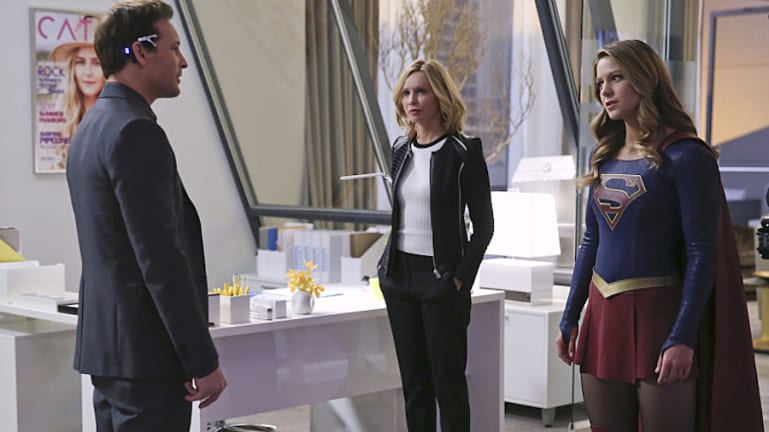
The totally not Borg Kryptonian apocalypse part one.
Supergirl stops an enthralled Lucy and other DEO agents from releasing all the Fort Rozz prisoners as part of Non’s plan. Superman’s wannabe girlfriend Maxima of Almerac shows up and gets punched out by Kara. Alex and J’onn are on the run disguised as a blonde mother and her little boy, on their way to find Jeremiah and Project Cadmus. Kara tries to get answers from the AI of her mom and the Kalex robot at the Fortress of Solitude about Myriad. They tell her nothing other than that it cannot be stopped.
At Catco, she discovers all her friends and coworkers are staring blankly and typing Kryptonian into computers. Cat, unaffected, swans in, joined soon after by Lord, who is also unaffected. He has a fancy headband with ion blockers to protect him, and he sent Cat a pair of earrings because they’ve clearly had sex at some point in the past he wanted her “mind” protected. Alex and J’onn go to Eliza Danvers for supplies and spill the truth about J’onn/Hank; Dr. Eliza geeks about J’onn being from mars (the best nerd Mom other than square nerd mom). Lord reveals his plan to Cat and Supergirl about a kryptonite dust bomb that would kill 3% of the population but protect the city (Kara and Supes would have to stay away for 50 years, too). Non and Indigo bicker: he is content with ruling Earth for their own good, she wants him to rule the universe.
Non goes to Catco to explain Myriad to Supergirl and convince her to join him. Myriad basically mindslaves everyone into solving the world’s problems because fuck free will, only the planet matters. When Supergirl refuses to join him, Non forces Winn, James, and a coworker named Kelly to jump off the balcony. Kara saves the boys, but Kelly dies. Eliza tells Alex and J’onn about Myriad, and Kara tells them to stay away over the phone. Of course, Alex refuses to stay away; J’onn agrees to help shield her mind, but it weakens him. Indigo wounds him and takes Alex captive. Kara reluctantly agrees to try Lord’s bomb plan, but Cat talks her into using hope instead.
Non decides to use Alex to get revenge against Kara for Alex killing Astra. Lord, Cat, and Kara go to Cat’s old TV station to piggyback their message of hope off of Myriad’s signals. Cat and Lord flirt some more. (Seriously, we want to know their history. Do they have hate sex? They probably have hate sex. Cat probably doesn’t care about it, and Lord’s probably alternately mopey and clingy. Sorry, we have way too many Lord x Cat headcanons). Outside the station, Alex shows up in full body armor and with the kryptonite sword she killed Astra with. She’s ready to rumble with Supergirl because Non can’t cope with his grief in a healthy way.
Best Quote: “I know you’re scared. I am too. But so is Max. And so is Non, for that matter. All of you are letting your fear guide you, but somebody has to find the courage to stand up even though they’re afraid. You know, the worst decisions that I’ve ever made in my life were based on fear. But you showed me that there was another way to be strong, by having faith in people, by believing that goodness would prevail. And because of you, I started letting people in. I even opened up myself up to my assistant, Kira, who helped me have a relationship with my son again. Now, I can’t tell you what to do, Supergirl, but if you’ve taught me anything, you have taught me that hope is stronger than fear. And that is what I think of every time I look at that [symbol on your chest]. You’ve changed me, and I am not easy to change. And I believe that you can change everyone out there. Not with violence, not with fear; just be Supergirl. That’s all anyone’s ever needed from you.”—Cat Grant, to Supergirl
Episode 20: Better Angels
The totally not Borg Kryptonian apocalypse part two.
J’onn flies in Eliza to help Kara snap Alex out of her Myriad induced haze. It works, and Kara proceeds to film her hope-filled message to the denizens of National City. Since Myriad affects the hope-centers of the brain, Kara’s message is able to help the people hope again, freeing them from Myriad. Pissed that Kara thwarted them, Non and Indigo decide to conquer the galaxy with Myriad and burn down the old Earth homestead for good measure. By increasing the frequency of Myriad, they will explode everyone’s heads except Supergirl and J’onn. J’onn is weakened, so Kara might have to fight Non and Indigo alone.
Prepared to die, Kara says her last goodbyes while we cry in the corner. J’onn is feeling better by the time the DEO discovers that Non and Indigo are at freaking Fort Rozz, which is crashed and cloaked in the middle of Nevada. As the Myriad headsplosion becomes immanent, Kara tries to talk Non and Indigo into not killing all humans. Non throws away the Fort Rozz power source so that Kara can’t stop Myriad. Now it’s rumble time. J’onn defeats Indigo by ripping her in half (damn). Kara and Non have a heat vision battle extraordinaire that she wins.
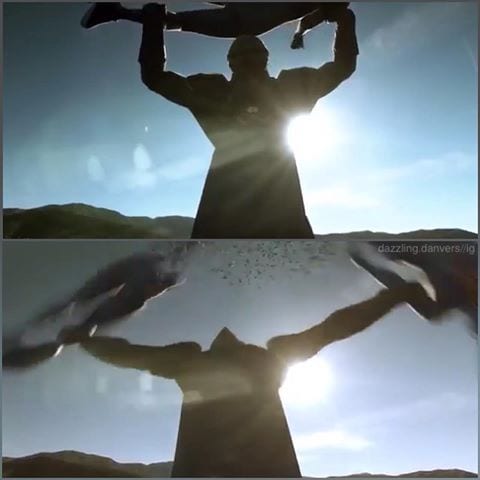
Since they can’t power down Fort Rozz/Myriad, Kara decides to fly it into space. She calls Alex to tell her the plan, and Alex tries to talk her down because if Kara flies into space, she won’t be able to get back home. Kryptonians fly by jumping, which means Kara has nothing to generate thrust with while floating around in space (looking at you Superman, Superman Returns, and Man of Steel). Supergirl flies Fort Rozz into space and we cry some more. Before she can die, Alex flies the pod that brought Kara to earth to rescue her. Oh, and Superman has been lying unconscious in the DEO this entire episode btw; he came to help Kara, but because he was raised on Earth, he was ‘too human’ and fell under Myriad’s sway.
Kara and Alex tell their mom that Jeremiah is alive and imprisoned by Project Cadmus. Hank is reinstated as head of the DEO. Cat gives Kara a promotion as a sign of her respect and belief in her (more crying). Alex, Eliza, J’onn, Winn, and James have dinner at Kara’s apartment. Kara and James make out. They all toast to family, but before they eat, they hear a noise. Kara and J’onn investigate, finding a crashed Kryptonian pod. Who/what is in it? Find out in three days when Season 2 premieres!
Best Quote: “Your attacker has sought to take your free will, your individuality, your spirit, everything that makes you who you are. When facing an attack like this, it’s easy to feel hopeless. We retreat, we lose our strength, lose our self. I know. I lost everything when I was young. When I first landed on this planet, I was sad and alone, but I found out that there is so much love in this world out there for the taking, and you, the people of National City, you helped me. You let me be who I’m meant to be. You gave me back to myself. You made me stronger than I ever thought possible, and I love you for that. Now, in each and every one of you, there is a light, a spirit, that cannot be snuffed out. That won’t give up. I need your help again. I need you to hope. Hope that you will remember that you can all be heroes. Hope that when faced with an enemy determined to destroy your spirit, you will fight back and thrive. Hope that those who once may have shunned you will, in a moment of crisis, come to your aid. Hope that you will again see the faces of those you love and perhaps even those you have lost.”—Kara Danvers/Supergirl, to the people of National City
Characters
We’re wrapping up our character overviews this week just in time for the season 2 premiere. We’ve had to overlook other minor characters due to space (Jeremiah Danvers, Vasquez, Miranda Crane, Cameron Chase, Adam Foster), but we hope you’ve gotten a good introduction to the primary and secondary protagonists and antagonists. As you can tell, we could wax eloquent for pages (and pages and pages) about these characters because they’re round, interesting, and complex. Any moments of inconsistency feel like blips on the radar rather than season long character assassinations or flat caricatures lacking emotional depth. You can really sink your teeth into these characters, and whether you’re more of an Alex (like Elizabeth) or a Kara (like Gretchen), we think there’s someone for everyone to see themselves reflected in, for the most part. The good news is that representation will be getting even better this coming season!
The Fantastic Four: Cat Grant
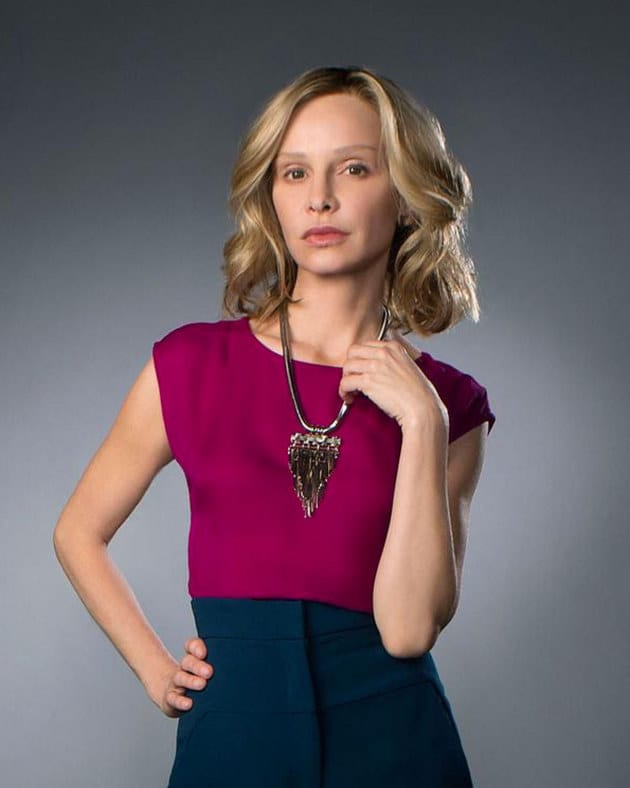
She’s more than a feminist mouthpiece (though an excellent one at that). She first graces our screens as a “Devil Wears Prada”/Anna Wintour style powerhouse CEO. Granted her vices are more amusing than malicious: an ice bucket of M&Ms instead of alcohol and a vehement desire for a perfectly hot latte. She quips about yoga and juice cleanses and consistently gets people’s names wrong. Kara goes by Kira most of the season and Winn by several different monikers (like, “that handsome little hobbit who has more cardigans than you do.”)
Yet rather than relying upon the expected stereotype of a female CEO ice queen, Supergirl nuances Cat Grant’s first impression. They even hinted at the truth bomb of her dysfunctional past in the Pilot, when Cat talks about being on Lexapro, an SSRI prescription medication most commonly prescribed for depression and anxiety. She also openly talks about seeing a therapist, so right off the bat Cat Grant is an excellent media example of an adult woman managing a very common mental illness.
We find the name-drop of the medication especially interesting, not only because there is still a strong cultural taboo against admitting the use of psychiatric medications (or taking them at all), but also because the show expects you to connect the dots yourself. It’s terribly uncommon to see portrayals of the “boring disorder spectrum” on television because they don’t make for good visual drama, and even more so for protagonist characters. Television needs more examples of adults managing mental illness well, and thriving. Cat Grant is an excellent one.
They don’t just name drop the medication then forget about it for the rest of the series, however. Episodes 4 and 7 give the audience a deeper look into Cat’s relationship with her emotionally and verbally abusive mother, through both her own personal account of it and by introducing her mother in person. Neglected, belittled, and made to feel inferior about her life and career choices, we get the impression that Cat’s psyche delicately balances a desire to achieve to spite her mother with Cat’s own ambitions and desires. She readily admits that much of who she is stems from her rocky relationship with her mother, and she is clearly determined to not make her mother’s mistakes with her own children or pupils.
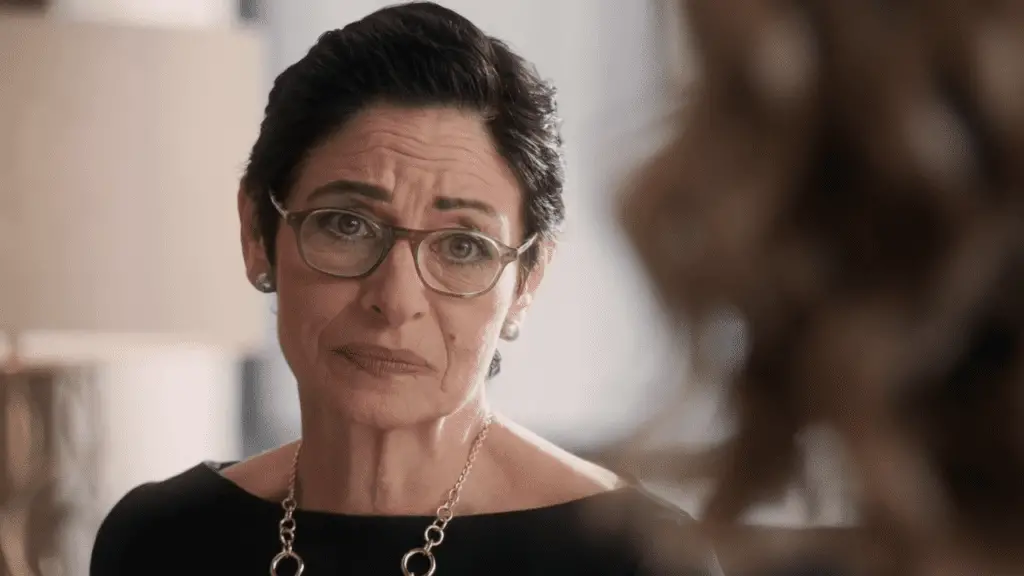
Cat’s mother occupies a difficult-to-define nebula of neglectful and damaging behaviors that a lot of people don’t even register as being abuse; her type of character is often framed as having high expectations of their children, but with good intentions. Supergirl makes no such excuses in its scripting. She is shown as being inherently selfish and dismissive of the emotional needs of both her daughter and her grandson, and when directly attacked by her mother’s behavior, Cat is visibly upset and angered by her actions. But she ultimately strives to be the better person, and to funnel those emotions into healthy outlets. If we seem like we’re harping a bit much on this, it’s because it hits quite close to home, and it’s not a relationship dynamic that is often well portrayed in television.
The influence of Cat’s mother makes her very blunt and openly critical, with high expectations for everyone around her, but unlike her mother Cat is never cold. In the first and second arcs of the season, Cat’s relationships with Kara, Livewire, Carter and Adam weave together into a narrative about her position as wife and mother. She willingly puts her son Carter’s needs above her own when she wins an award. She voices regret over putting her son up for adoption, yet admits she would not have been a good mother for him at the time. Despite her fear of rejection, she meets with Adam. When their interactions go poorly, she’s willing to let Kara help her gain a second chance, and she learns how to put Adam before her regrets.
Her pep talks with Supergirl and Kara take on a strong motherly/mentorly tinge as the season progresses as well. She puts up important boundaries after Adam and Kara break up, but the mentor in her will not let the relationship stagnate for long. Her giving Kara her own office and a chance to prove herself is the culmination of a season long relationship of growing trust and respect. In fact, we think Cat’s roles as mother, mentor, and businesswoman are so intertwined as to be difficult to tease out. As they should be; any woman inherently understands how these three roles do not exist in a vacuum.
She’s not quite cynicism turned idealism, but it approaches that arc. She begins the season as fairly pragmatic about her work and role as “most powerful person in National City”. She’s a fairly standard media mogul, but because of her relationship with Supergirl, she begins to perceive herself and Catco’s role in National City differently. She chooses to become a beacon of hope and optimism instead of a tabloid. Like Supergirl, she gives people the benefit of the doubt in her media portrayal, choosing a more moderate and truthful approach than the standard overblown headline driven media that saturates our own world. Even when she does profess to clickbait (with Senator Crane), she does it with the deliberate intention of giving loud-mouthed, bigoted politicians the rope to hang themselves in the media.
The Supporting Heroes: Eliza Danvers
 Though a tertiary character, Eliza Danvers’s presence pervades the season. The absence of her physical presence on our screens is not evidence of her absence from the lives of her children. Whether it be the healthy sisterly bond between Alex and Kara, or Kara’s own sense of stability in human life, Eliza’s role as their mother grounds it. Are we over-emphasizing her role in her children’s lives? After all, human beings are responsible for their own choices in Supergirl’s narrative world. At the same time, given the thematic importance of family (see below), we think it fair to hype Mrs. Dr. Danvers a
Though a tertiary character, Eliza Danvers’s presence pervades the season. The absence of her physical presence on our screens is not evidence of her absence from the lives of her children. Whether it be the healthy sisterly bond between Alex and Kara, or Kara’s own sense of stability in human life, Eliza’s role as their mother grounds it. Are we over-emphasizing her role in her children’s lives? After all, human beings are responsible for their own choices in Supergirl’s narrative world. At the same time, given the thematic importance of family (see below), we think it fair to hype Mrs. Dr. Danvers a little lot for how accomplished and heroic her girls grew to be.
Think about it. Jeremiah Danvers went missing ten years ago. Kara Danvers is twenty-four when the series begins and twelve when she crashed on earth, so she only lived with the Danvers’ for two-ish years before Jeremiah went missing. Eliza Danvers raised the two teenage girls as a single mother for a decade. On top of losing her family, Kara lost her adopted father. Alongside the stress of gaining an adopted alien sister that she was responsible for and jealous of due to her having superhuman powers, Alex lost her dad. Yet despite the trauma, Alex and Kara have a strong, supportive, loving bond. They say “I love you” all the time. They hug and talk things out and spend time watching TV together. They’re the most important people in each other’s lives (like, for real, we cannot emphasize this enough); they’re each other’s heroes. If that doesn’t say something about Eliza Danvers as a mother, we don’t know what does.
Yet we also know she is flawed. She and Jeremiah put undue pressure on Alex to keep Kara from getting into trouble or using her powers. Alex internalized the pressure to the point that it blows up in her mother’s face when Kara comes out as Supergirl (Episode 4). Eliza dotes on Kara, but pressures Alex. It’s a recipe for stereotypical sisterly catfighting. Instead, Supergirl gives us a healthy, and realistically flawed, family dynamic. It says as much about Eliza as the head of the family for the past ten years as it does about Alex and Kara being able to work past their differences and jealousies.
She and Jeremiah are Superman’s first thought for an adoptive family for his cousin, and he clearly made the right choice. Eliza and Jeremiah took in a teenage alien refugee and loved her like their own daughter. Even when that choice resulted in Jeremiah working for the DEO (which he distrusted and disliked) and eventually his presumed death but real life imprisonment and torture. Even these things did not turn Eliza into a bitter woman. She did not take her pain out on Kara, an understandable reaction to the perceived ‘cause’ of her husband being missing. Instead, Eliza continued to love and protect Kara. She raised an intelligent, caring, compassionate, emotionally strong and stable pair of daughters in the midst of tragedy without losing her own mind, heart, or strength in the process.
She never lost her individuality either. Her scientific interests manifest when she meets J’onn, and she can’t help but pester him for details about his physiology and ability to shapeshift. She’s as much a nerd as her husband and from what we know, as equally capable of a scientist as he. She’s might have a tinge of over-protectiveness, but she allowed both girls to move away from home and live their own lives. What we see of her on screen leaves us wanting to know more about her: more about how she raised the girls on her own, more about her as a scientist, and more about her as a grieving wife now aware that her husband has been subject to government experimentation and not dead as she had presumed.
The Sympathetic Villains: Non
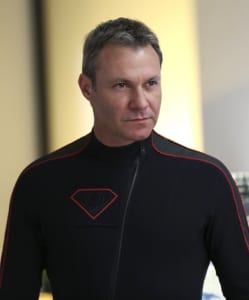 Non and Astra break the mold of male/female villain teams in many ways. A male second in command who never rebels against his female commander. A husband and wife team where she has more power and he does not resent it. A power couple where the woman’s emotional bonds to family might appear to undermine her commitment to an ideological cause but never her as a leader. A male villain who grieves for his dead wife before teaming up with an old flame rather than cheating on his wife. An ideologically driven eco-terrorist male character not in it for glory, fame, power, sex, or money. Non might be the darker grey of the two, but he’s just as compelling.
Non and Astra break the mold of male/female villain teams in many ways. A male second in command who never rebels against his female commander. A husband and wife team where she has more power and he does not resent it. A power couple where the woman’s emotional bonds to family might appear to undermine her commitment to an ideological cause but never her as a leader. A male villain who grieves for his dead wife before teaming up with an old flame rather than cheating on his wife. An ideologically driven eco-terrorist male character not in it for glory, fame, power, sex, or money. Non might be the darker grey of the two, but he’s just as compelling.
Despite the opening to do so, he does not defy Astra’s authority. She is his general and though he might question her commitment to the cause, he does not rebel or try to usurp her. The writers could have gone the route of “weak women and your feelings will be the end of our cause. a strong leader, a man must lead us” but they don’t. He never judges her feelings for her family, her blood ties; he only challenges her commitment to Myriad and the cause, which they believe (or say they do) is saving humanity/the planet from humanity’s destructive ways the way they couldn’t save Krypton. It’s impressive given how normalized the weakness of female (or female coded) emotions are used as a plot device to propel a villain forward.
An interesting aspect to their villain arc is the prioritization of the planet itself over humanity. They look down on humans as an infestation ruining the planet. The planet is what matters; he’s not saving it for human beings, but from human beings. He’s more concerned with the planet than human lives and wholeness. He represents just how swiftly the desire to protect and do good can be warped into ugliness when abstract ideals are prioritized over sentient lives. Not that the other side of the spectrum doesn’t exist (Krypton looms large in this regard), but Non’s story represents one extreme. Non, like Astra, has benevolent goals in mind but that does not legitimize his means. The Black Mercy might in theory sound preferable to death, but Kara’s experience evinces that being trapped in a delusional fantasy world can be as painful as torture and death. His ‘mercy’ is indeed black, a twisted mercy that hurts more than it preserves because when she wakes up, she loses her family all over again (as well as Astra when Alex kills her).
It is also interesting to note that while Non takes on a much looser interpretation of the Kryptonian rules of engagement and cultural codes of conduct than other Kryptonians we’ve seen, he is still fundamentally a man of his word. He explicitly brings Kara to Astra’s funeral, as Kryptonian tradition demands that the surviving matriarch performs the rites. He also honors the mourning period, despite having some very real motivators for not doing so, both from within and without. He is an extremist, and an authoritarian one at that, but still manages to be both relatable and sympathetic due to his adherence to his cultural and personal code of honor.
The Big Bads: Indigo
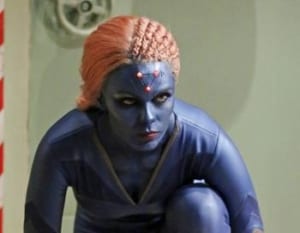 She’s the least rounded of the three Big Bads this season, and the one most approaching a stereotype. We know little about her other than that she comes from Colu, a planet inhabited by a race of super intelligent cybernetic beings. Imprisoned in Fort Rozz for attempted genocide, she is considered the most dangerous of the prisoners. She has a previous sexual history with Non that she exploits in their partnership, twisting his desire for delivering Earth from ecological disaster to that of inter-galactic conquest.
She’s the least rounded of the three Big Bads this season, and the one most approaching a stereotype. We know little about her other than that she comes from Colu, a planet inhabited by a race of super intelligent cybernetic beings. Imprisoned in Fort Rozz for attempted genocide, she is considered the most dangerous of the prisoners. She has a previous sexual history with Non that she exploits in their partnership, twisting his desire for delivering Earth from ecological disaster to that of inter-galactic conquest.
While there are uncomfortable twinges of the Madonna/Whore complex about her physicality and sexualized relationship with Non versus Astra’s, the presence of non sexualized female villains somewhat mitigates her more stereotypical scripting. Her sexualization isn’t pervasive either. She’s not a sexual manipulator like Melisandre; she’s really only sexual around Non because of a whatever their implied historical relationship was. Nor does she ever use sex to motivate him. She’s more of a devil on the shoulder than a ‘do what I want and I’ll give you sex’ character. Her manipulation is rooted in twisting Non’s grief rather than sexual favors.

Her motivations lack the same level of nuance seen with the other Big Bads as well. While we know she attempted genocide on Krypton, we do not know why. The moments she appears on screen, she seems motivated more by a love of chaos, destruction, and power than anything sympathetic. She desires the destruction of the human race from a combination of boredom, egotism, and love of destruction. Oddly enough, she reminds us of Dark Superman with her careless disregard for ‘lesser beings’, only without the bitter frustration of enabling human weakness with the use of her powers for good. While we appreciate having a female braniac/superhacker villain, we would have appreciated a bit more grey from her. As she exists in the season, there’s little to sympathize with.
The most intriguing part of her arc is her role as the author of her own demise. As the one who brought Kara to Earth from the Phantom Zone, she both frees herself and the other convicts from Fort Frozz as well as freeing the source of their doom: Kara Danvers in her pod. Her blindness to the power of hope that Kara represents and spreads blinds her to her inevitable defeat.
Theme: Found Family
We’ve already spoken about coded language within the show for marginalized individuals, but perhaps the best place in which this coding shines is in the show’s focus on found family. Kryptonians would say, “Blood bonds us all,” but in Supergirl it is more true to the original intention of the phrase ‘blood is thicker than water’: the blood of the covenant is thicker than the water of the womb. Pointedly, Astra attempts to use the Kryptonian phrase to bring Kara onto her side, but Kara reminds her Aunt that blood binds everyone, not just biological family. Thus even before her encounter with the Black Mercy, Kara aligns herself more closely with the family she found and created on Earth.

The essence of Kara’s story is one of found family, as with her cousin Superman. But unlike Clark, Kara remembers life on Krypton, which makes her choice to reject the Black Mercy that much more difficult and resonant. Unlike Kal-el, she remembers her former world and the pull to get lost there, to live there with the family she remembers and loves, is a very, very strong. If you’ve lost what you’ve loved and are given a chance to have that all back, that’s hard to walk away from. She’s given a chance to have a perfect family. For an adopted child, a refugee, and a literal alien, how could she resist? Think of all she or J’onn lost. Like Buffy, she’s given a chance at heaven, at peace and repose from all the pain and labors of being a superhero on Earth. She’s given a chance to be normal and loved. Granted it’s a delusion, but still. It’s her own fantasy. Yet unlike Buffy, she leaves of her own volition to be with her loved ones. And she didn’t just choose love, she’s chosen pain. She’s chosen to be hurt, to be vulnerable, to be human, and not just an alien refugee. Earth is her true home, not Krypton.
It isn’t just Kara’s obvious pull between Krypton and Earth either, or J’onn learning how to embrace Earth as his true home after his family dies and real!Hank tries to kill him. Almost every character has pain when it comes to family, especially parents. Grief over a lost parent (James, Kara, Alex), a toxic relationship with a living parent (Cat, Winn), a broken family due to a parent’s choices (Siobhan), a strained relationship with a living parent who struggles to acknowledge your independence and choices (Lucy). The spectrum runs from tension due to different desires in life (Lucy and General Lane) to verbal and emotional abuse (Cat and Katherine Grant) to the extreme dysfunction of Winn’s father attempting to get his son either imprisoned or killed along with him “so at least they can be together”. Supergirl hits just about all of the major dysfunctions and struggles between parents and children. Characters struggle with whether or not to define themselves by the dysfunction and pain associated with birth family. How they land on that choice often determines whether they become a villain or a protagonist.
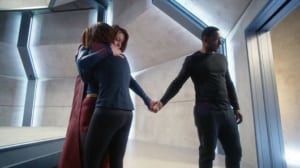
Those characters that choose bonds outside of their dysfunction find stability and meaning in non-romantic relationships, in their found family friendships and mentorships. Kara builds a team to represent her family’s motto “Stronger Together”. Rather than hiding her superhero self from those she loves, she invites them into her new reality both to support her and as equal members of her team. J’onn J’onzz builds a new found family unit in his relationships with Alex and Kara.
“My daughters were named K’hym and T’anya. It’s not the same, but any man would be proud to call you his daughters.”—J’onn J’onzz
While none of these relationships replace the broken and strained birth family ties, they do provide the stability, love, and freedom of true family. The strong bond between Eliza Danvers and her two daughters, and them with each other (see above), perfectly encapsulates Supergirl’s emphasis on the power of found family. As adults with broken relationships with our own families, this theme rings true and beautifully represents our experience.
Spotlight On: Pacing, Plot Twists and Dramatic Tension Done Right
Supergirl approaches pacing issues like the use of cliffhangers and inter-character conflict in a fundamentally different way than mainstream media. We’ll start with the most obvious: the finale. The writers could have chosen to leave Myriad or the love triangle with Kara and James unresolved. They could have left Fort Rozz or the future of Non/Indigo ambiguous to leave room for a ‘return’ of these villains in later seasons. They could have left a looming threat. Instead, the finale involves what or who survived the crashed Kryptonian pod, a great use of a cliffhanger that has nothing to do with bodily injury or relational tension. We haven’t seen one done that well in years. We’re so used to death, kidnapping, the threat of violence and who it might be against (see The Walking Dead), or relationship drama for the end of seasons. A mystery box reveal? Unexpected and well done.
The success of the finale’s cliffhanger stems in part from the resolution of the Myriad conflict. Supergirl had defeated Myriad, National City returned to normal, Fort Rozz expelled into space. The good guys had won and begun their celebrations. Kara and James had finally (FINALLY!) fully expressed their feelings for each other and gotten some face-on-face action. Then, at the peak of resolution, a new tension, and an ambiguous one. Over the summer the contents of the pod have leaked out (Spoilers), but even knowing creates more of a mystery than it solves, just a different kind than we’re used to seeing.
The refusal to use physical harm or death as a cliffhanger extends to the rest of the season. The closest they come is the battle between Non and Kara between episodes 8-9. Even there the tension has less to do with fearing Kara dead than wondering what will happen next. We won’t deny that our appreciation for the pacing of physical threats and violent conflict resolution comes from our Shock and Awe™ fatigue.
We believe a threat doesn’t have to be unresolved to be emotionally impactful. Continuous and prolonged lack of resolution loses its impact on the audience. Thankfully, Supergirl agrees. A heartbeat of the audience fearing Alex might be dead when she gets shot functions as well narratively, if not better, than ending an episode without resolution. Audience members can’t sustain that kind of emotional tension week after week, so well-paced resolution provides spaces of relief, which can then make room for more tension elsewhere.
The same applies to relational conflicts. Miscommunication never drives the tension or drama. Characters talk out their differences like adults and in a timely way that still respects the depth of emotion the characters would experience in those situations. The most drawn out relational tension of the season—Kara’s anger at Hank when she thinks he killed Astra—lasts no more than 2.5 episodes. Even so, it is never made the focus of the narrative. It lurks under the plot and informs how characters interact, but is never the all-consuming relationship drama seen on other shows. Winn’s disappointment at Kara’s rejection lasts a single episode. Alex’s frustration with her mom is resolved by the end of Episode 4. The love triangle never takes control of the story and functions more as a slow burn romance than a source of catfighting or cheap relational tension.
We must emphasize also just how well the tension works. There are some real nailbiter episodes (Kara stopping the nuclear missile for example). We know Kara will triumph, but the stories are so well done, we’re still invested despite what some might call a ‘lack of stakes.’ The tension flows from our investment in the characters, not our concern over their death. We want Kara to win and get the guy. We hate to see her fall because her joyfulness inspires us and we love her.
Resolution of this nature generates trust. As we look to season 2 and our (justifiable) concerns over how the show will handle the inclusion of an LGBT character, we can trust the writers to handle such a character with more sensitivity than other writers and shows this past year. Supergirl has proved itself capable of handling drama and tension in a way that both generates audience sympathy without violating it by needlessly punishing them for their investment.
Three cheers for resolution!
Most Relatable Quote of Season One
Elizabeth:
“People of National City, this is Supergirl, and… I hope you can hear me. We have been attacked, mothers and fathers, friends and neighbors, children, everyone, suddenly stopped by a force of evil as great as this world has ever known. Your attacker has sought to take your free will, your individuality, your spirit, everything that makes you who you are. When facing an attack like this, it’s easy to feel hopeless. We retreat, we lose our strength, lose ourselves. I know. I lost everything when I was young. When I first landed on this planet, I was sad and alone, but I found out that there is so much love in this world, out there for the taking. And you, the people of National City, you helped me. You let me be who I’m meant to be. You gave me back to myself. You made me stronger than I ever thought possible. And I love you for that. Now, in each and every one of you, there is a light, a spirit, that cannot be snuffed out, that won’t give up. I need your help again. I need you to hope. Hope that you will remember that you can all be heroes. Hope that when faced with an enemy determined to destroy your spirit, you will fight back and thrive. Hope that those who once may have shunned you will in a moment of crisis come to your aid. Hope that you will see again the faces of those you love, and perhaps even those you lost.” -Supergirl’s speech to the people, the speech that saved the day.
This is the superhero narrative I remember from my childhood, the one that gave people the benefit of the doubt and staked everything on the idea that people are fundamentally good, deep down. Nolan’s Batman may be the hero that we deserve, but Supergirl is the hero that we desperately need. Sometimes, all it takes for ordinary people to do extraordinary things is someone to believe that they can. What makes you a hero is not what you are, but who you aspire to be. Supergirl asks you to live up to your better angels. And because of that, she made me believe in superheroes again.
Gretchen:
“Life isn’t perfect. I know it can be hard and it can be lonely. Especially for you. You have sacrificed and you have lost so much. I wish you could’ve had a life with your family. But even if you did, Kara, it wouldn’t be this. Because this isn’t real. And deep down, Kara. Deep down, you know it. I can’t promise you a life without pain and loss because pain is a part of life. It’s what makes us who we are. It is what makes you a hero. You fight every day to keep people from struggling like you have.”—Alex to Kara when she’s fighting the delusions of the Black Mercy.
Like, story of my life in a single paragraph, wanting to help people because of the pain and trauma. I might not consider myself as openly optimistic as Kara, but her motivations as a hero ring true to my self-perception. I’ve experienced a lot of trauma and pain, and my goal with my writing/work is to keep other people from struggling the way I have in life. I’m going to try my damnedest to live up to Supergirl’s heroism.
Thoughts on Season 2
We’d like to take a moment to discuss the marketing of season 2, as it has sparked a bit of controversy within the tight-knit Supergirl fandom due to the large focus on the introduction of Superman as a fully realized character, as opposed to a mostly symbolic silhouette. While prioritizing a male guest star over the actual protagonist of the show is a bitter pill to swallow, we’d like to offer some defenses to the show’s marketing team. Feel free to throw us over the barbecue if we end up being wrong, we’ll stick the apples in our mouths ourselves.
Supergirl is sort of an odd duck of a show, and the marketing for it has been consistently inconsistent because of that. It has an extremely female-dominated cast, and two of the recurring male characters are black men. It has a relentlessly positive tone, and one that goes head-first into very serious emotional territory with the kind of sympathetic tone you’d expect from a good therapist. It is also a budget intensive show, which was further compounded by being filmed in LA. All of this was rolled into a superhero tv show airing on CBS, a network that has little else of similar tone or content. Despite this perfect storm of Cancelled In The First Season elements, it did reasonably well in the ratings and developed a strong core following, which we’re sure was as much of a surprise to the network as it was to us. In fact we’d honestly wager a guess that no one was necessarily planning for a season 2, considering how all the plots of the first season are wrapped up in a neat little bow. If you cut the season finale right at the dinner scene where the cast is toasting ‘to family,’ you have a complete story, no second season required.
But fortunately, the show did get a second season, and one that involved moving the show onto CW, CBS’ companion (subordinate?) network. Now, we know that a lot of you just got a chill down your spine at the mention of that network. And we’re with you on that to a degree, considering a certain other show from the CW was the beginning of our writing partnership. Shows on the CW haven’t exactly had the greatest track record with the treatment of minorities, dating back to when it was still the WB, and there has been a historically conservative leaning within the directorship of the network (Tara’s death on Buffy, the first season of Arrow, two wlw characters dead in the Spring Slaughter…you get the point). But it is important to draw a line in the sand between what the network dictates and what the individual show runners produce, and if we’re being honest we don’t think the network is shouldering the lion’s share of the blame.
The most obvious motivator for moving the show to the CW is so it sits beside its companion superhero stories (all four of the shows share two of their primary writers), and it was clear from the excellent Flash crossover episode that the writers are committed to integrating Supergirl into the CW DC Universe lineup. Further evidence to this is the fucking awesome Superhero Fight Club 2.0 teaser released last week, which heavily featured Kara as the star, while integrating her (and J’onn!) into the already existing DC Universe mash up. Having all four DC Universe shows in the same place, with one show a day Monday through Thursday, conveniently bunches together the whole DC tv fandom into one convenient place.
A second motivator is the budget: Supergirl is, naturally, a CGI heavy show, which is compounded with its already heavy-duty, Downtown-LA filming budget. We are eternally grateful that Calista Flockhart agreed to follow the show to its new filming location in Vancouver, as it was a condition of her original contract that the show be filmed in LA since she didn’t want to have to extensively travel. Moving the show to Vancouver makes sense, as it is much cheaper to film there, but also because the other DC Universe shows are filmed in that location, which will streamline the crossover events, which let’s be honest, are like half the fun of superhero universes.
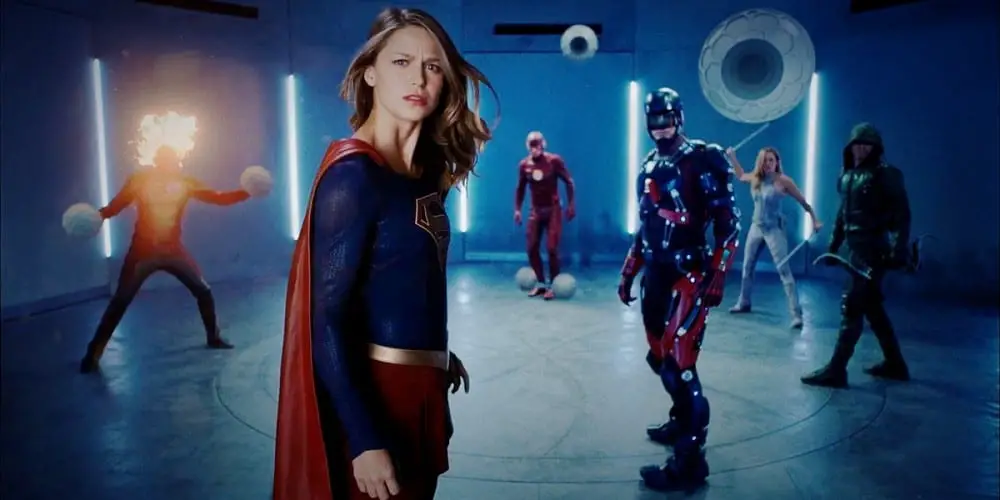
Back to the Superman issue. Keeping mind all of the factors we’ve discussed above, we’d also like to say this: Supergirl is the newcomer in the CW’s DC Universe lineup, and that lineup is 1.) male dominated, and 2.) heavily dependent on B to D-list level superheroes (sorry Flash and Green Batman Arrow). Superman is a huge character (DUH) and bar none the biggest character within the CW’s DC Universe line up, to the point that we have to wonder how many producers had to cut an arm off to get the rights to bring the Man of Steel to the small screen again.
The reason why the CW is hyping up Superman so much is reasonably obvious when you think about it: they know that Supergirl’s core fandom will probably make the network jump without a problem. They aren’t trying to convince us to watch the show, they’re trying to convince the audience from Flash, Arrow, and Legends of Tomorrow to watch the show. For DC fans that are on the fence about Supergirl, the inclusion of Superman is a particularly juicy carrot on the end of a stick. Is this kinda sexist? You bet your bottom! Is it understandable from a marketing perspective? Yea, it is. And you know what; if it gets a new wave of fans to watch the show who would otherwise pay it no attention, fine. As long as the show remains true to its roots, we’re willing to tolerate a bit of tone-deaf marketing.
That being said, we don’t want to give the impression that we don’t have some very high expectations of Supergirl in its sophomore season. The majority of the creative team and all of the cast is making the jump to the new network, and we expect nothing less than the standard of excellence the first season spoiled us with. We also expect the show to start polishing off its rougher edges.
We have talked a lot about LGBT coding in the scripting, and we want to see the inclusion of actual LGBT characters. The companion DC Universe shows have a smattering of them, so Supergirl really has no excuse. Now, we won’t say that the introduction of Maggie Sawyer (a canon lesbian character) is a guarantee of LGBT representation, nor is the staff hinting at Ms. Sawyer being a huge part of Alex’s character development this season, but we’d be lying if we said we weren’t crossing our fingers harder than the twist ties on a new action figure’s packaging. If this is not the direction they’re going in, believe us when we say we’re gonna be grinding our teeth down to the nubs in queer-baited frustration. But we can give a tiny bit of the benefit of the doubt to the network for being a bit tight-lipped about it, since a certain other show taught them an important lesson about mindfulness in marketing. As low of a bar as this is to set, we’d rather they not bother at all than get our hopes up. Not that we aren’t going to slow-roast them over the coals if they screw it up just the same, but we appreciate the lack of pandering.
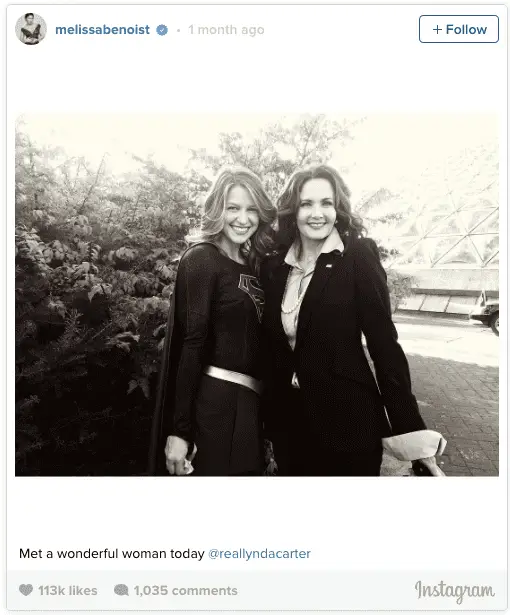
We would also like to see the inclusion of more WOC; the show has a nice variety of MOC in the main cast, but the female cast is significantly more monochromatic. We definitely appreciate a varied female cast in terms of characterization, but the show could stand to have some more variation in terms of race. Thankfully, that seems to be something they’re changing as well. Over the summer they’ve announced Floriana Lima, Sharon Leal, and Dichen Lachman will be guest starring. They’ve also announced another MOC in the main cast, Ian Gomez, who will be playing Snapper Carr, the new editor-in-chief of Catco Magazine. Although unrelated to diversity, we also have to mention that Lynda Carter (yes, THE Lynda Carter, freaking Wonder Woman) will be playing the President of the United States. We’d also like to see more butch women depicted on screen, though we’ll have for the season to see how they do with that. Since Supergirl has already set such a high bar for itself in the first season, we want to pull a Cat Grant and accept nothing less than the best that it can be.
Extra Tidbits
- The Colonel who comes to investigate J’onn with Lucy is a headnod to James “Jim” Harper, aka ‘The Guardian’, a C list DC comic book hero kind of like Captain America.
- Indigo seems a bit of a Lady MacBeth shout out as she’s urging Non to take over the universe; interesting given that her first conversation with Non has a Shakespeare reference.
- The omegahedron power source is a shoutout to Supergirl: The Movie
- Yet more LGBT coded language when James Harper, upon learning Hank is actually a J’onn, tells J’onn: “You’ve around my home, my children, my children.”
- Excellent use of cameras to communicate Alex’s drunkenness in “Manhunter” without being over the top or vomit-inducing (and we’re sensitive to shaky-cam, so we appreciate them holding back).
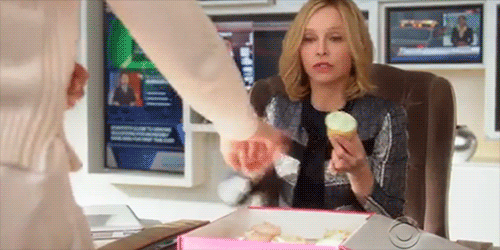 The flashback to Kara being overwhelmed by her powers at school as a child really simulates well what being hypersensitive to sensory input feels like, but x100.
The flashback to Kara being overwhelmed by her powers at school as a child really simulates well what being hypersensitive to sensory input feels like, but x100.- Never, EVER steal Cat’s cupcakes. >>
- Winn reaching out to talk Siobhan down highlights how far Winn himself has come in his journey toward the light. Now he’s the one being the hero to the distressed friend.
- Humans defending superheroes is one of the best tropes. Gives us all the feels.
- We approve of the choice to cast former WWE star Eve Torres for Maxima. We hope she’s in S2 with Superman.
- We forgot to mention in last week’s article on Choice and Consequences that in Episode 19, the narrative frames the removal of choice as one of the most evil things possible. Even if the end is honorable (saving the planet from ecological disaster), removing human choice violates all the ethical codes of conduct. Points again to the importance of choice and agency and that people must be allowed to live with the consequences of their choices.
- Note also, that like removing choice, only the villains choose revenge on Supergirl. This is in marked contrast to The 100 and Game of Thrones.
- “As long as you keep treating everything as black and white you’re going to keep breeding the same time of hate and resentment that allowed the Kryptonians to try and kill us today.”—Great line from Lucy Lane about why prejudice and hate needs to be overcome with hope
- Agent Vasquez saying “ma’ams” is one of the best lines ever.
- In the finale, Kara makes an excellent distinction between giving up and acceptance, understanding her purpose, facing the reality of what might happen, and accepting (‘I’m at peace with it’) no matter the cost.
- We love that General Lane tells Kara, “You try moving a one million ton alien spacecraft!” and then she does, and succeeds.
Thanks for sticking with us! We hope we’ve inspired you to start watching Supergirl (which was our evil plan goal). Join us Tuesday to read our review of the season 2 premiere, which is Monday, October 10th, at 8pm. Until then, choose hope!


